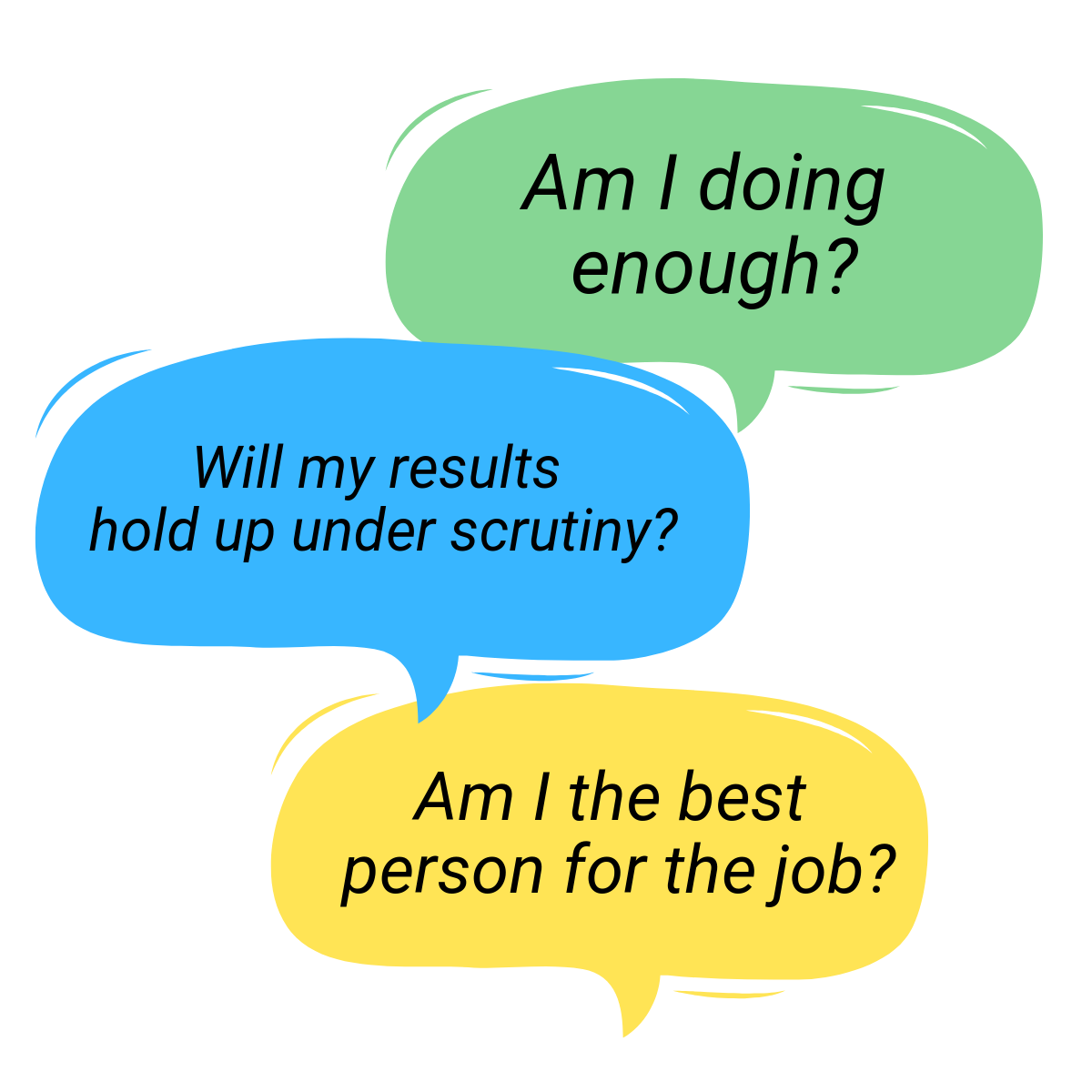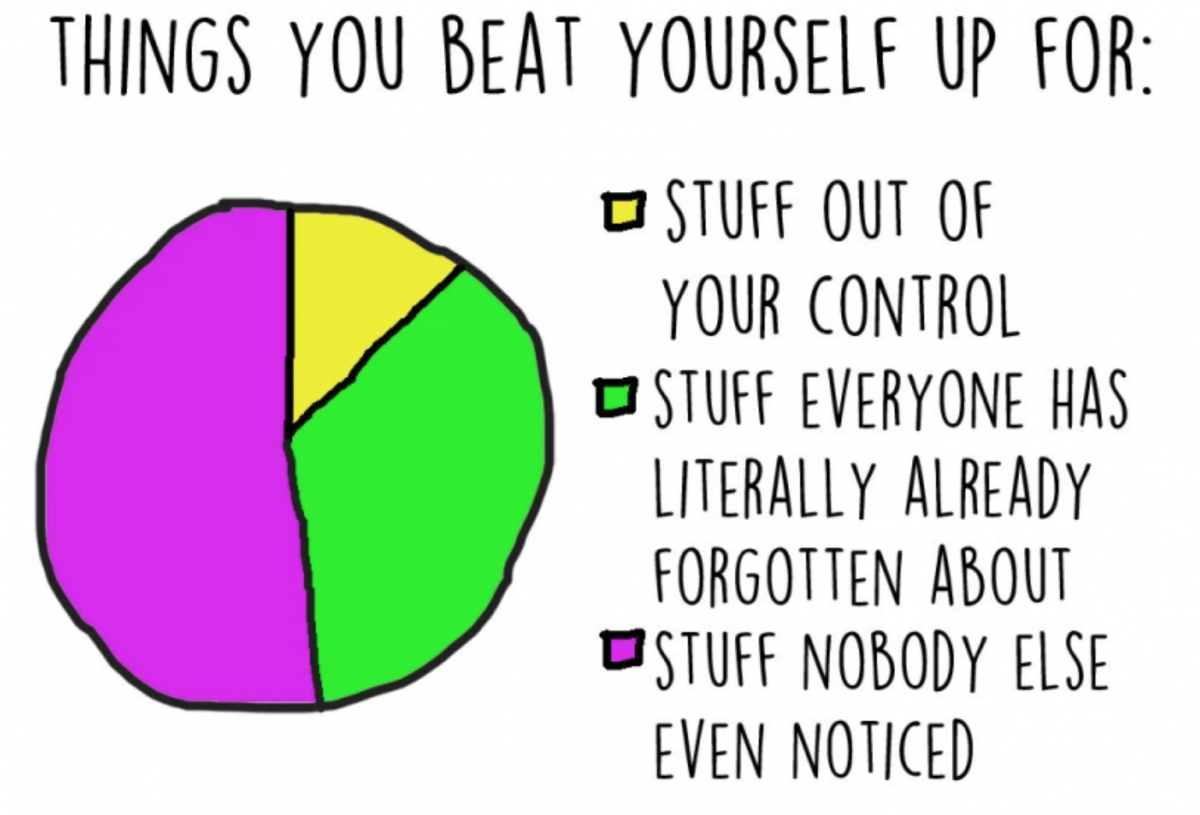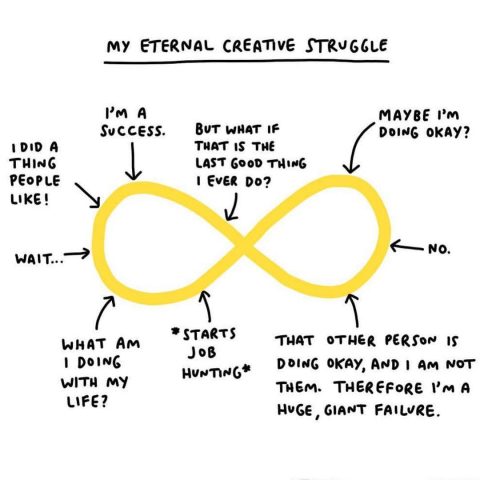Like many others, me and imposter syndrome go way back.
If you’re reading this, you most likely know what I’m talking about. The gnawing feeling that you’re out of place. The anxiety of not knowing whether you’re living up to expectations. The inability to say “thank you” to compliments and just take them in.
These pop up even on the sunniest of days, in spite of your morning having promised something completely different just a few hours before.
A year after I wrote this article (initially published on Jan 30, 2019), I decided to revisit it in a dedicated podcast episode, simply because I received so many emails and messages from people who resonated with the message and who found something helpful in my story. So here it is, uncut and unedited.
Too often, imposter syndrome kept me from writing, especially for my own blog and personal projects. That’s something I regret. On a bigger scale, it also stopped me from picturing myself in other roles and contexts because I believed “I’m not that type of person”.
That’s why I didn’t realize I have the entrepreneurial mindset needed to build a freelancing business until early into my ‘30s.
But, hey, imposter syndrome is not some magical creature living on my left shoulder. It’s all in my head. I know it but that doesn’t (always) make it easier to live with. Lately, though, it’s been getting a bit better and I noticed the things that made it so.
[bctt tweet=”#ImposterSyndrome can hold you back from living a better, more meaningful life. Here’s how I’ve learned to handle it and push through self-doubt to achieve more:” username=”@andrazaharia”]
I won’t lie: I haven’t found a permanent solution to silencing imposter syndrome but I do have some practical tips on how to deal with it in a way that doesn’t keep you from thriving. Maybe you’ll find them helpful.
What imposter syndrome feels like
Imposter syndrome wasn’t really talked about when I got my first job in digital communication, over 10 years ago (right at the onset of 2008 nonetheless). I figured out there may be an underlying issue much later when I was about 25.
With a bit of experience under my belt, I got involved in more complex projects and took on more demanding roles. That’s when I started having frequent pangs of self-doubt.
As you may have guessed, self-confidence was never really my strong suit. Au contraire.
Feeling inadequate, having trouble fitting – I carried these with me from my teens to my ‘20s. My initial solution to imposter syndrome was to throw myself into studying and, later, work.
Except that’s not a solution and all I did was manage to burn out for the first time at just 20 years old when I had my bachelor’s exam and thesis.
Unfortunately, the persistent fear of failure stuck with me through the 3 really bad burnouts I’ve had since then.
On the bright side, each of these meltdown episodes taught me to pay more attention to myself and take better care of my mental and emotional health.
What scared me into building balance is that I got physically ill because somatization accompanied these prolonged periods of stress.
Source: 13 Charts That Will Make Total Sense To People With Impostor Syndrome
There were many challenges but my life was not that bad. In fact, I had many things to be proud of. The issue is that I couldn’t internalize success as I did with failure. You see, imposter syndrome gets stronger when you don’t have the ability to recognize your own achievements.
With the excitement of a new job came the fear of getting exposed for not knowing everything I was supposed to know. Enthusiasm couldn’t overshadow that I didn’t excel at everything like I (unrealistically) expected myself to.
This is what imposter syndrome felt like. It still has the same sharp tongue but I have changed. I’ve gotten better at managing these doubts to avoid self-sabotage. For the most part, at least.
When we spend our lives waiting until we’re perfect or bulletproof before we walk into the arena, we ultimately sacrifice relationships and opportunities that may not be recoverable, we squander our precious time, and we turn our backs on our gifts, those unique contributions that only we can make. Perfect and bulletproof are seductive, but they don’t exist in the human experience.
Why we need to talk about imposter syndrome
I decided to write about what helps me deal with this because I know self-doubt that can become paralyzing.
Not addressing this feeling of imposture pushes people into overworking themselves. It makes them unhappy with their jobs, their lives or their relationships. It keeps them from asking a well-deserved raise. It determines them to set unrealistically challenging goals only to trigger disappointment when they don’t achieve them.
Take it from people who have studied the topic extensively. According to research from 2011, imposter syndrome is defined by 6 characteristics:
1. The Impostor Cycle
“Overworking is one observed and self-perceived pattern of the Impostor Cycle. Overworking becomes problematic when the amount of effort and energy invested in a task exceeds that for producing work of reasonable quality (Clance, 1985), and interferes with other priorities. Even though individuals with impostor fears recognise this overworking pattern, they often find it difficult to break this cycle. Clance (1985) observed that Impostors often have strong beliefs that they will become a failure if they do not follow the same working style.”
2. The need to be special or to be the very best
“Impostors often dismiss their own talents and conclude that they are stupid when they are not the very best.”
3. Superman/Superwoman aspects
“Impostors often feel overwhelmed, disappointed, and overgeneralize themselves as failures when they are unable to fulfill their perfectionistic goals.”
4. Fear of failure
“For Impostors making mistakes and not performing at the highest standard precipitates feelings of shame and humiliation.”
5. Denial of competence and Discounting praise
“Impostors attribute their success to external factors to a greater degree than non-Impostors”
6. Fear and guilt about success
“For example, when their successes are unusual in their family or their peers, Impostors often feel less connected and more distant. They are overwhelmed by guilt about being different (Clance,1985) and worry about being rejected by others.”
Source: The creative cycle
I believe imposter syndrome can become toxic and harm your health, just as it did with mine.
More and more people face these challenges and I wanted to share my experience so you’ll know you’re not the only one who feels this way and that there’s is something you can do about it.
We need to talk about it because I’ve seen people beat themselves up and put themselves down instead of doing the opposite. These are usually the best, most hardworking, helpful people who never cease to amaze me with what they create and how they behave.
Overachievers are especially at risk of feeling like a fraud and women are more prone to experiencing this than men.
Statistics show that most of us feel like phonies. The industry I work in particular records one of the highest percentages of people who suffer from imposter syndrome.
Source: 2011 research.
Source: June 2018 study.
Source: June 2018 study.
So there you have it. It’s here. How do we deal with this fear? I propose we…
Try a change of perspective
At the end of the day, imposter syndrome boils down to various types of fear:
- The fear of not knowing enough
- To fear of not fitting in / being accepted
- The fear of failure.
I found a few compelling arguments written by Paul Jarvis in his book – “Everything I know” – that prompted me to consider a change of perspective.
Here’s what he writes (highlights are my own):
“Courage doesn’t come from an absence of fear; it comes from [dt_highlight color=”86d694” text_color=”” bg_color=””]being afraid and moving forward anyway.[/dt_highlight]”
“In the beginning, you might fear that you won’t be successful. Once you achieve some success, you might be afraid that you won’t get any more. Once you have a lot of success, you might worry about letting down your now-sizable audience if you change anything or say the wrong thing. At any stage, [dt_highlight color=”86d694” text_color=”” bg_color=””]there are always fears[/dt_highlight].”
“[dt_highlight color=”86d694” text_color=”” bg_color=””]Failure is a requirement for success[/dt_highlight], so don’t shy away from it. Instead, embrace failure as a stepping stone to greatness.”
“If you [dt_highlight color=”86d694” text_color=”” bg_color=””]frame ideas as experiments[/dt_highlight], you can’t technically fail at anything. You’re just going to prove or disprove a theory you’ve arrived at through experimenting. And if it doesn’t work the first time, you can iterate and try something different. It doesn’t work until it does.”
“There aren’t really any experts, though, just [dt_highlight color=”86d694” text_color=”” bg_color=””]people further along in their individual journeys[/dt_highlight].”
Paul also mentioned another useful idea to add to your mental toolkit, this time in one of the episodes of the Creative Class podcast:
“You’re afraid of what you haven’t already done.”
I tend to trust Paul that these ideas work. He’s been skillfully navigating the fears of freelancing for over 20 years. What’s more, I believe in the behavioral change that framing has. If I could “re-program” some of my beliefs (that’s another article), I can certainly do the same with the fear imposter syndrome packs at its core.
[bctt tweet=”“There aren’t really any experts, though, just people further along in their individual journeys.” says @pjrvs and I agree! Stop #impostersyndrome from weighing you down. Here’s how:” username=”@andrazaharia”]
For example, the worst thing that can happen once I publish this post is that some of you will hate it. That’s not going to trigger Armageddon. I might get upset if you email me bad feedback but I will get over it eventually.
On the bright side, I’ll have written 2500+ words, hitting my daily goal (5X-ing it, actually) and gotten a bit better at expressing my thoughts clearly and in a compelling manner.
With this mindset shift in view, let’s consider the options you have to shush imposter syndrome so you can use your energy for building yourself up.
How to manage imposter syndrome
Reframe failure as experimentation
My list of tips starts with the idea I mentioned above about reframing failure as experimentation.
Once you put this into practice, you can dedicate yourself to building and improving your process. Focusing on your process to improve incrementally doesn’t feel as risky as taking a bit leap of faith. You can also put your energy into working on various bits of your project, for example, before assembling and shipping it.
[dt_highlight color=”86d694” text_color=”” bg_color=””]Here’s a personal example[/dt_highlight]: I developed a checklist for validating blog post ideas and for writing and optimizing them but I rarely used it for my own content. It’s time I focused on following the steps that have resulted in great results for my personal projects as well.
Use your values to make better decisions
To make sure you’re not getting sidetracked by imposter syndrome, use your values to guide your choices. Write down your values, privately or publicly, and turn to them when you feel lost or get caught up in a vicious cycle of self-doubt.
[dt_highlight color=”86d694” text_color=”” bg_color=””]For example[/dt_highlight], when I decided to quit my job and start freelancing, my need for autonomy, for flexibility, for getting things done faster and more effectively played an important role.
Get better at knowing yourself
Another thing that helped me is building self-awareness. Like many people who work in communication, I’ve always been attracted to psychology and philosophy. Reading more about these topics nudged me to track and reflect on my own thoughts, mental models, and behavior.
It’s also helped me become more aware of my progress, which comes in handy when you feel you don’t master anything.
Our own development can be so subtle that we may feel we’ve made none. [dt_highlight color=”86d694” text_color=”” bg_color=””]For instance[/dt_highlight], reading a difficult book and getting it is, for me, a sign that I’ve learned from previous experiences and I’m now able to grasp increasingly complex notions and arguments.
Try therapy or coaching
What really took my self-awareness to the next level was going to therapy to deal with anxiety and depression. Later, I built on that with the coaching I received during the altMBA and at work, from my mentor.
Know imposter syndrome is temporary
Another important realization I had about imposter syndrome is that it’s temporary. Just like anxiety, it may feel permanent, but remember it’s not. It may come and go but do remember it always goes away eventually. The more you’re aware of how it manifests, the more you can focus on its transitory aspect.
Ask for an external viewpoint
There’s nothing as important as getting perspective from others when you feel like a fraud. What has made a big difference for me is having a close group of friends who I can turn to when imposter syndrome strikes. Besides my best friends, I’m also part of a mastermind group of four incredible ladies who support each other with overwhelming generosity.
Build a support system
I find having a support system made of either family members or close friends invaluable to living a meaningful life. When you face your worst fears, it helps to talk to people who can remind you of everything you’re capable of and all that’s good around you.
Keep track of your evolution
Speaking of remembering achievements, I tried journaling for a while and it did wonders for my state of mind. Around 2 years ago I started a daily gratitude journal, jotting down each day’s blessings, even when I found it most challenging.
Reading it always put me in a good mood, focusing my attention on wanting to multiply those moments rather than spiral into anxiety. I know now write in it infrequently but I’ve developed a mental habit of counting my blessings more often.
When I started freelancing, almost 2 months ago, a good friend advised me to start an achievement journal to help me weather the more difficult days. I did just that and I already have some milestones to celebrate that strengthen my belief that I chose the right path.
[bctt tweet=”3 ways to stop #impostersyndrome from sucking up all your energy: cultivate self-awareness, keep track of your evolution, talk to others. Here are 9 more helpful tips that work for me:” username=”@andrazaharia”]
Avoid generalization
When failure does happen, as it inevitably does, try to avoid generalization. Stop yourself before you go from “I didn’t do this right” to “so I can’t do anything right”. Starve the imposter syndrome before it grows into a monster in your head.
Seek to understand and demystify
A super practical way to check in with the reality of things is to listen to podcasts that break down processes and demystify industries and roles. It really helps to consider that nothing is as glamorous as it looks like on the internet.
One example I found super helpful is the Creative Class podcast by Paul Jarvis and Kaleigh Moore. They break down and analyze the key aspects involved in freelancing, candidly sharing their own stories and examples.
Contact people you admire
Reaching out to people you admire is next on my list of tested and tried tactics. Each time I mustered the courage to get into a conversation on Twitter or email one of the people I look up, I got a bit braver. When they replied, it was even better!
I’ve done this again and again until it felt less like anxiety and more like excitement. Without this practice, I couldn’t have made the How do you know? podcast. My way across was keeping a learner’s mindset and looking to continue to learn from them in every way I could.
Read a lot of good books
Last, but not least, read good books to kick imposter syndrome’s butt. There are some great authors out there, whose work illuminates the mind, guiding you through confusing times and complex choices.
Here are a few I recommend:
- The Art of Possibility by Rosamund Stone Zander and Benjamin Zander
- Thanks for the Feedback by Douglas Stone
- The 7 Habits of Highly Effective People by Stephen R. Covey
- If Only I’d Listen To Myself – Jacques Salomé and Sylvie Galland
- The Obstacle is the Way by Ryan Holiday
- Becoming by Michelle Obama
- Atomic Habits by James Clear.
You can find lots more on this most recommended books by The CEO Library community or by listing the references in your favorite books.
The only way is through
Silencing the imposter syndrome is certainly something you can do too. You don’t have to check off all these 12 tips but you could certainly take a swing at some of them.
- Reframe failure as experimentation
- Use your values
- Build self-awareness
- Try therapy or coaching
- Remember it’s temporary
- Get an external perspective
- Build and nurture a support system
- Keep an achievement or a gratitude journal
- Avoid generalization
- Seek to understand and demystify industries and roles
- Talk out to people you look up to
- Read good books.
You may find yourself building resilience and a calmer state of mind by focusing on what really matters and makes a difference which, to me, is making things happen.
I hope you’ll get so good at living with imposter syndrome that you use it to pursue your craft to the point of mastery, building a group of wonderful people to share everything with.
And if you ever need someone to talk to about it, drop me a line and I’ll gladly help!
PS: This 4-minute TED Ed video on the topic is an excellent resource as well:


